Films reviewed: “All is Lost”, “As I Lay Dying”, “B For Boy”, “Exhibition” (above), “The Fear”, “Hide Your Smiling Faces”, “Jeune et Jolie”, “Kill Your Darlings”, “Mystery Road”, “Sarah Prefers to Run”, “Sixteen”, “Weekend of a Champion” and “Wounded”.
This year’s London Film Festival was split into strands including Cult, Debate, Documentary, Galas, Journey, Laugh, Love, Official Competition and Sonic. These reviews cover the Dare, First Feature and Thrill strands. My main scheduling regrets were Stranger by the Lake and A Touch of Sin.
Anyway, here are the reviews. It might be of interest that B for Boy and Sixteen were world premieres. For more, follow me on Twitter at @halfacanyon.
All is Lost – 8.5/10
Director/Writer: JC Chandor
Starring: Robert Redford
UK release date: 26th December 2013
US release date: 18th October 2013
Strand: Thrill
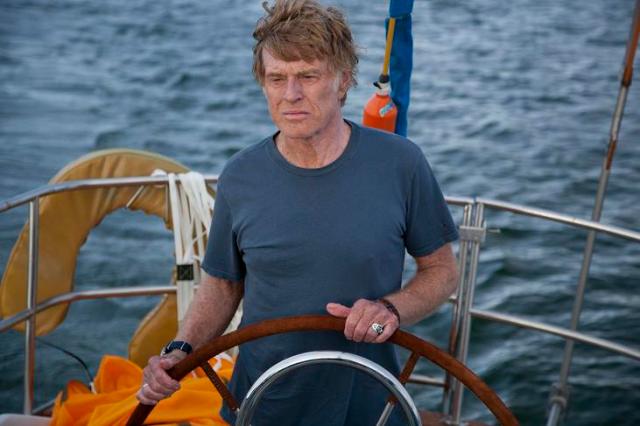 It was at least an hour into All is Lost when I noticed the inordinate amount of water I’d been drinking; I could see it in the other cinemagoers, sitting restlessly, sipping from their bottles. By this point, barely a word had passed through the tired lips of Robert Redford, the film’s lonesome figure.
It was at least an hour into All is Lost when I noticed the inordinate amount of water I’d been drinking; I could see it in the other cinemagoers, sitting restlessly, sipping from their bottles. By this point, barely a word had passed through the tired lips of Robert Redford, the film’s lonesome figure.
A brief voiceover introduces All is Lost, with the rest void of dialogue. Redford, aged 77 (I still find this hard to believe), mans a sinking ship while grappling for survival; a guidebook, a map, some strange biscuits, anything that might help.
It’s likely Redford took to the sea to escape the stresses of modern life, hide from demons, or rest in solitude. However, that’s all speculation, as it’s never explained. In isolation, without any signs of help beyond his watery surroundings, his sole occupation is staying afloat – all while feeding himself scraps and fending off the creatures that lie beneath the surface.
JC Chandor sticks to a degree of realism with his direction that, although encompasses CGI, pulled me in with a claustrophobia that’s redolent of Polanski’s Knife in the Water. I hate to make the obvious comparison, but All is Lost makes a case that Life of Pi should have scrapped all dialogue and voiceovers.
It’s a cliche that actors walk into an audition with a Shakespeare monologue. Redford undertakes the harder task of captivating an audience through winces and irritated expressions. The viewer is made aware of his rations and number of flares; as they slowly dwindle, the emerging mood turns existential with an elderly man staring out at sea waiting to die.
As I Lay Dying – 7/10
Director: James Franco
Writers: James Franco, Matthew Rager, William Faulkner (novel)
Starring: James Franco, Tim Blake Nelson, Ahna O’Reilly, Logan Marshall-Green, Danny McBride
UK release date: TBC
US release date: 22nd October 2013 (VOD)
Strand: Dare
“My mother’s a fish.”
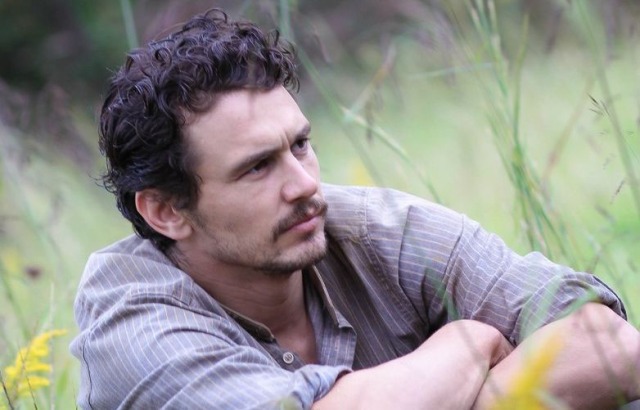 Faulkner. Franco. Faulkner. Franco. Say those names in quick succession and they’ll eventually become one. Well, not quite, but that’s the chopped up method attempted by James Franco – he directs, co-writes and stars in this fairly faithful adaptation of William Faulkner’s As I Lay Dying.
Faulkner. Franco. Faulkner. Franco. Say those names in quick succession and they’ll eventually become one. Well, not quite, but that’s the chopped up method attempted by James Franco – he directs, co-writes and stars in this fairly faithful adaptation of William Faulkner’s As I Lay Dying.
The stream-of-consciousness novel, dating back to 1930, is somewhat digestible in comparison to The Sound and the Fury, yet still a challenge to bring to the screen. Not that you’d tell by Franco’s assured, very serious vision, which maintains the technique of switching narrators. Even a small role for Danny McBride isn’t for comic relief.
The Bundren family are brought together by a crisis when their mother (Beth Grant) dies and needs to be buried elsewhere. Dragging the coffin becomes a semi-Sisyphus affair, both as a physical task and through escalating tensions within the group.
Led by the father (Tim Blake Nelson), small squabbles percolate through the distracted family; Dewey (Ahna O’Reilly) is troubled by an unwanted pregnancy, Cash (Jim Parrack) breaks his leg, Jewel (Logan Marshall-Green) feels like an outsider, Dahl (Franco) has his mind elsewhere, and 10-year-old Vardaman (Brady Permenter) is like a kid from Outnumbered.
However, like the novel, the star is the shifting narration – the screenplay even manages to include a monologue from the mother long after her death. Franco frequently splits the screen, sometimes for thematic juxtaposition (on one side Dahl stares forlorn, opposite him is a fire), other times for a second angle of the same event. It’s occasionally off-putting and admittedly irritating, but it’s also a bold way to shift perspectives; occasionally, the voiceover crosses spills into the silence like a Venn diagram.
Some audiences might find the split screen too much to handle. Indeed, the final credits flashing on and off is definitely a step too far. For the rest, the mournful atmosphere carries into artful shots of what is ultimately a futile exercise – a resentful family suffer through various obstacles, with the rotting corpse weighing heavier by the moment. (Dahl comments, “What’s in the box? It ain’t going to go away.”)
With some fairly weighty religious undertones thrown in, As I Lay Dying needs someone like Franco’s arrogance to take an ambitious project so whole-heartedly. And for that, it’s a commendable effort. Just beware that it doesn’t just split the screen – it splits the audience.
B For Boy – 8/10
Director/Writer: Chika Anadu
Starring: Uche Nwadili, Nonso Odogwu, Ngozi Amarikwa
Any release date: TBC
Strand: First feature
“I’m not ready to have this conversation yet.”
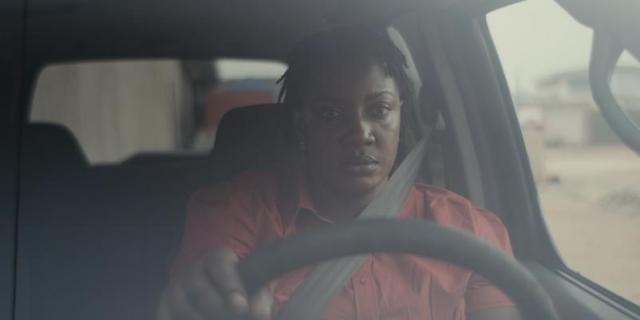 Set in Nigeria, B for Boy is a simple story that’s even more shocking through the matter-of-fact acceptance of difficult circumstances. The country’s social landscape demands women give birth to a boy in order to pass on male genes – a conceit Hollywood would probably treat as a comedy starring Paul Rudd. However, B for Boy portrays the biological tightrope with heartbreaking realism; the difference between keeping and losing an otherwise loyal husband.
Set in Nigeria, B for Boy is a simple story that’s even more shocking through the matter-of-fact acceptance of difficult circumstances. The country’s social landscape demands women give birth to a boy in order to pass on male genes – a conceit Hollywood would probably treat as a comedy starring Paul Rudd. However, B for Boy portrays the biological tightrope with heartbreaking realism; the difference between keeping and losing an otherwise loyal husband.
Amaka (Uche Nwadili) is the protagonist: a 39-year-old mother with a daughter and husband (Nonso Odogwu). When a doctor informs her of a stillbirth and the likelihood she’ll never conceive again, her mother-in-law suggests the husband should find a second wife who can continue the family heritage. It doesn’t take long for the suggestion to be unveiled as a threat.
The family’s politics are disconcerting on their own, especially viewing as a male Westerner unaccustomed to the pressure of delivering a son. Chika Anadu, the director and screenwriter, distils the sadness with weighted silences and minimalist shots; the walls are blank, the camera trembles.
On top of a moving central performance, Amaka represents the eternal mother than exists in Western culture, making ugly sacrifices in secret to maintain her family. Just because it’s not as glamorous as Heisenberg’s meth dealing in Breaking Bad, underlying patriarchal philosophies transcend nations; the mother-in-law says she’s not a villain, but someone who prioritises her son’s wellbeing.
B for Boy taps into the fragile psyche of motherhood’s template, transported to an environment underrepresented in cinema. Considering the deft performances, measured direction and pathos-led atmosphere, this is one social commentary with more self-reflection than expected.
Exhibition – 7/10
Director/Writer: Joanna Hogg
Starring: Viv Albertine, Liam Gillick, Tom Hiddleston
UK release date: Early 2014
US date: TBC
Strand: Dare
“Take this tree.”
 A few critics walked out of Exhibition, with their clanging footsteps breaking the unsettling silence hanging over the third film by Joanna Hogg; Archipelago seems like a holiday in comparison. Hogg once again examines middle-class relationships and architecture, but with a closer inspection on one particular home: tall glass windows, an unnecessary spiral staircase, inhabited by an inert couple.
A few critics walked out of Exhibition, with their clanging footsteps breaking the unsettling silence hanging over the third film by Joanna Hogg; Archipelago seems like a holiday in comparison. Hogg once again examines middle-class relationships and architecture, but with a closer inspection on one particular home: tall glass windows, an unnecessary spiral staircase, inhabited by an inert couple.
The two unnamed artists are played by Viv Albertine and Liam Gillick, although they don’t exactly dabble in watercolours. Albertine is particularly experimental, with her own room upstairs devoted to posing sexually, often in front of her window. Downstairs is Gillick, who works more conventionally at a desk.
When the couple have sex, Albertine lies still and motionless, like a statue waiting to be undressed. The lack of intimacy is reflected outside the bedroom; they communicate during the day through an intercom, with Albertine even asking, “Are you cold?”
However, the protagonists don’t dislike other, nor do they pang for anyone else. Instead, their positioning within their sparse, shiny house suggests they gradually merged with the furniture. At least, that’s my interpretation of Albertine’s sleeping lions game in various rooms and a peculiar intimacy with a ribbed chair.
Exhibition requires discipline, especially with the sheer length of scenes that are unfathomable or repetitive. But the architecture of both the film and the house unravel as a complex retort to middle-class aesthetics – by eating an edible model of the estate, the decadence leaves behind a few crumbs. Whether in view of a street or inviting friends to a party, the couple are forever in performance – their love is expressed by not being artists to each other. If walls could talk, it might be like this.
The Fear – 2.5/10
Original title: La Por
Director: Jordi Cadena
Writers: Jordi Cadena, Núria Villazán
Starring: Igor Szpakowski, Roser Camí, Ramon Madaula, Alícia Falcó
Any release date: TBC
Stand: Dare
“You wanted me to be alone.”
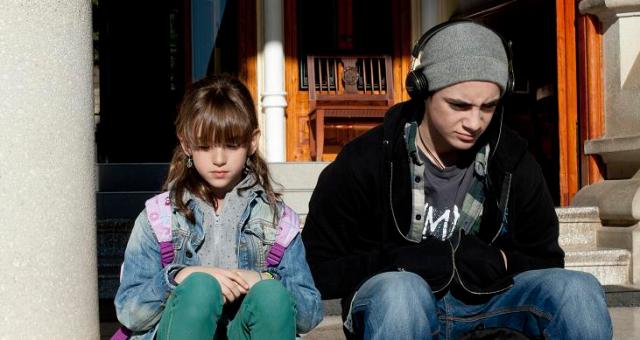 Jordi Cadena, the director of The Fear, is very keen early on to punish the viewer through unpleasant images, with a very long close-up of a toilet filling up with urine. The rest of the film isn’t too dissimilar.
Jordi Cadena, the director of The Fear, is very keen early on to punish the viewer through unpleasant images, with a very long close-up of a toilet filling up with urine. The rest of the film isn’t too dissimilar.
The Fear places itself as an ultra-serious, minimalist take on how domestic abuse can tear a family apart. Well, it’s hardly a revelation, and is explained through a family’s quiet breakdown. The mother and her two very young children are terrified of the violent father, not so secretly waiting for him to leave. Coping methods involve running away, hiding in bed, or just putting up with it.
The dramatic climax is completely unearned and pulled off with heavy-handed direction (the daughter covers her doll’s eyes). So much of The Fear is laughable, yet it’s a serious subject worthy of a more mature treatment – one that actually has something to say.
It’s easy to criticise slow films where supposedly nothing happens. The Fear, however, wallows in its own emptiness while attempting to be important. The tone swings inconsistently between realism and failed symbolism – the latter made even worse by trite dialogue that forms an unfortunate punchline. (“You wanted me to be alone.”)
The Fear attempts to send a message, and it does: try harder with your next film.
Hide Your Smiling Faces – 3.5/10
Director/Writer: Daniel Patrick Carbone
Starring: Ryan Jones, Nathan Varnson, Colm O’Leary, Thomas Cruz, Christina Starbuck
Any release date: TBC
Strand: First feature
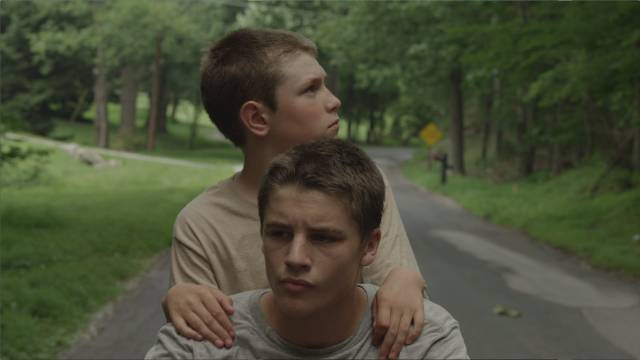 I spent the first half of Hide Your Smiling Faces thinking Carbone was ripping off George Washington. The final act consisted of me wishing he would return to ripping off George Washington. Not even David Gordon Green has been able to recreate George Washington. Hide Your Smiling Faces shares a similar storyline, involving how children overcome an accidental death. The cinematography is fairly decent, in that it mimics the look of George Washington right down to an obligatory motorcycle journey.
I spent the first half of Hide Your Smiling Faces thinking Carbone was ripping off George Washington. The final act consisted of me wishing he would return to ripping off George Washington. Not even David Gordon Green has been able to recreate George Washington. Hide Your Smiling Faces shares a similar storyline, involving how children overcome an accidental death. The cinematography is fairly decent, in that it mimics the look of George Washington right down to an obligatory motorcycle journey.
However, George Washington slinks along naturally, with all the layers overlapping beautifully. Carbone’s film is less organic and feels constructed. At the Q&A, I was ready to ask about the George Washington until Carbone brought it up himself in the first few sentences.
Jeune et Jolie – 7.5/10
English title: Young and Beautiful
Director/Writer: François Ozon
Starring: Marine Vacth, Géraldine Pailhas, Frédéric Pierrot
UK release date: 29th November 2013
US release date: TBC
Strand: Dare
“Your sister’s weird.”
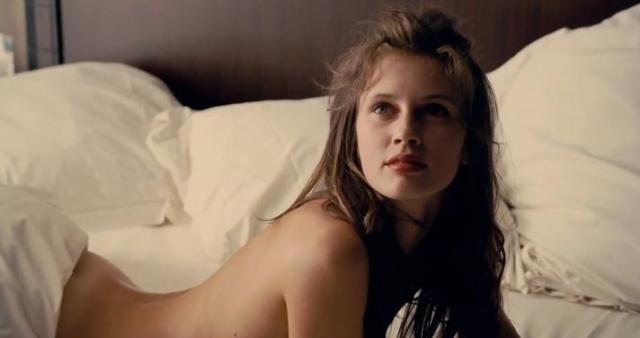 Turning 17 can be difficult, partly as it’s the bridge between a life without worries and having to consider career paths. Isabelle (Marine Vacth), a sexually curious 17-year-old mixes a few of her adolescent needs in Jeune et Jolie: within a few months of losing her virginity, she discretely becomes a prostitute.
Turning 17 can be difficult, partly as it’s the bridge between a life without worries and having to consider career paths. Isabelle (Marine Vacth), a sexually curious 17-year-old mixes a few of her adolescent needs in Jeune et Jolie: within a few months of losing her virginity, she discretely becomes a prostitute.
Isabelle’s lucrative profession only runs in the late afternoon, so she can escape detection from her mother, stepfather and brother. In that plot aspect, it shares a similarity with Belle du Jour, but François Ozon applies more realism; after a while, hotel room sessions and frequent showers just become part of a routine.
From an early stage, Isabelle’s sexual appetite is demonstrated as a healthy part of growing up (even if it crudely involves a pillow). Through a time jump, Ozon skips her first client and early nerves. She’s still clearly a teenager – when she pretends to be 20, the older men she sleeps with are turned on knowing it’s a lie.
Her innocent bedroom mannerisms are endearing to some customers; even without a pimp, she avoids any violence. In fact, her self-run business would impress Mark Zuckerberg, given the admin is managed through an outdated mobile phone without internet access.
When Isabelle’s mother inevitably finds out, her heartbreak is both understandable and unfair; there’s no other reaction, but Ozon somehow turns prostitution into a simple exploration of sexuality that can pay for her education, purchase a subscription to Sight & Sound, or whatever it is 17-year-olds do with pocket money
Although prostitution is dangerous, especially with Isabelle’s vulnerable timidity, the only victim (on a physical level) is one of her clients, who dies from, well, enjoying himself too much. In that sense, there’s a lurid fairytale aspect not too dissimilar from the independence of Don’t Tell Mom the Babysitter’s Dead – okay, that might be a stretch.
Still, Isabelle’s hotel antics are part of her coming-of-age story, which is arguably no different from having sex with strangers after a party, except it comes with a criminal label. After all, Ozon’s more interested in the self-fulfilling prophecy of adolescence; when a psychiatrist hints at absent father issues, Isabelle just laughs off the question.
Kill Your Darlings – 7.5/10
Director: John Krokidas
Writers: John Krokidas, Austin Bunn
Starring: Daniel Radcliffe, Dane DeHaan, Jack Huston, Ben Foster
UK release date: 6th December 2013
US release date: TBC
Strand: First feature
“You’d be boring without me.”
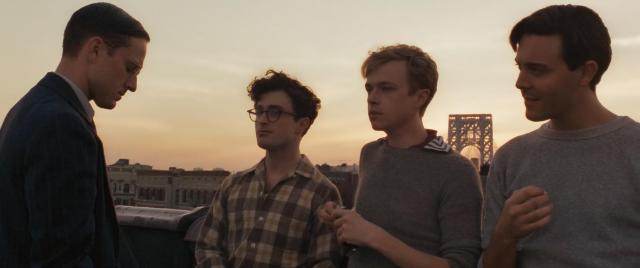 The difficulty in translating the Beat Generation to screen is turning into a challenge to the film industry, with a battered copy of Naked Lunch flailing in front of a frustrated producer’s face. As last year’s On the Road predictably demonstrated, the drug-induced hazes of Beat literature tend to be lifeless when acted out.
The difficulty in translating the Beat Generation to screen is turning into a challenge to the film industry, with a battered copy of Naked Lunch flailing in front of a frustrated producer’s face. As last year’s On the Road predictably demonstrated, the drug-induced hazes of Beat literature tend to be lifeless when acted out.
So what makes Kill Your Darlings different?
Well, it’s decidedly more focused. Rather than bring literature to life, John Korkidas uses his directorial debut to explore the catalyst for the writers’ movement. At the centre is Allen Ginsberg (played by Daniel Radcliffe with extra curly hair), aged 17 – it’s 1944 and over a decade before he’d write the first draft of Howl. Like Hogwarts, much is made of the shyness in starting a new school, and Ginsberg quickly finds a new friend in Beat ringleader Lucien Carr (Dane DeHaan). Their shared interest in rebellious literature leads to them befriending the likes of Kerouac and William Burroughs. It’s rather charming, if you ignore the playful suicide attempts and traces of self-hatred.
Carr is one of the unknown heroes of the Beat writers, mainly because he wasn’t one. His role was to engage and inspire; he smugly informs Ginsberg, “You’d be boring without me.” DeHaan clearly has fun in a role that’s both egotistical and insecure. Carr delivers passionate speeches about identity, while at the same struggling with his sexual identity. Tellingly, he’s surrounded by some of the generation’s greatest poets, but is unable to compose a verse.
To avoid creative impotence, Carr goads Ginsberg (or “Ginsy”, as he affectionately nicknames him) into breaking away from metre and rhyme; they spot Ogden Nash in a jazz club, and decide he’s the enemy. In a tremendous moment of foreshadowing, Carr retorts that the best revenge isn’t killing someone, but making sure they’re forgotten.
Radcliffe’s performance is similarly nuanced through Ginsberg’s back story and guessing, as a viewer, which incidents help to shape his future. The role demands maturity, yet rather smartly places Ginsberg’s small figure in classrooms to show he’s still just a young boy, unsure of what to expect from the world.
The story’s darker turns aren’t apparent until much later in Kill Your Darlings, by which point all the characters are established enough that earns core incident the dramatic weight it deserves. As someone who’s studied the Beats at university, written essays and exam papers on Kerouac and Ginsberg, I was unfamiliar with the plot. I believe this is the first film adaptation of said event (which I’m not revealing), and it reveals the allure of Lucien Carr – in many ways, a Dean Moriarty for Ginsberg. As the credits point out, Carr requested his name be removed from the dedication in Howl.
Unfortunately, not everyone is as richly shaped. Some enticing names are barely touched upon, namely David Cross as Allen’s father, and Elizabeth Olsen’s wasted appearances as Edie Parker. The episodic screenplay also places a few comic set pieces at the expense of deeper understanding of fringe players. Sure, I won’t forget Jack Huston as Jack Kerouac, squeezing into a beer keg that’s rolled down a hill – but I’m not sure what else about him I’ll remember.
Even more egregious is the anachronistic soundtrack which opens the credits with The Libertines. It may be attempting to bring relevance or prove the Beat Generation’s spirit lives on, but that already takes place with the literature. In the few teasing moments, there’s awe as a few lines are drawn out from Ginsberg’s mouth, particularly in a midnight boat ride so inspiring, he can’t hold back the poetry. And that’s the magic of Kill Your Darlings.
Mystery Road – 5.5/10
Director/Writer: Ivan Sen
Starring: Aaron Pedersen, Hugo Weaving, Jack Thompson
UK/US release date: TBC
Strand: Thrill
“Massacre Creek.”
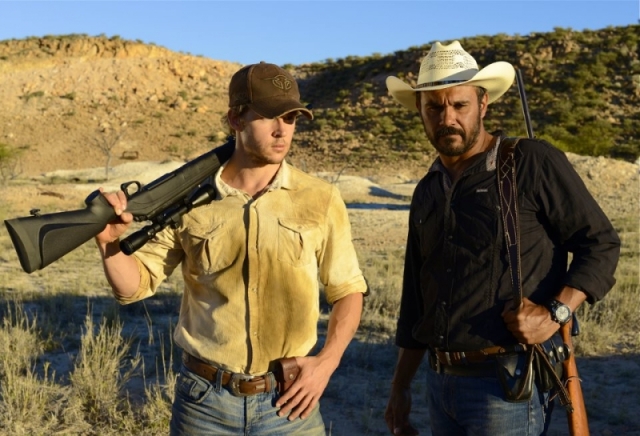 The opening scene of Mystery Road takes place in Massacre Creek. There’s also a real sign labelled Mystery Road. While it doesn’t go as far as having Exposition Lane or Surprise Twist Avenue, Mystery Road is a crime thriller with an eye on style – or, to be more accurate, its absence.
The opening scene of Mystery Road takes place in Massacre Creek. There’s also a real sign labelled Mystery Road. While it doesn’t go as far as having Exposition Lane or Surprise Twist Avenue, Mystery Road is a crime thriller with an eye on style – or, to be more accurate, its absence.
Set in rural Australia, Aaron Pedersen stars as an Aboriginal policeman returning to a town plagued with crime, racism and apathy. The drama begins with the dead body of a young girl, possibly involved with drugs and prostitution, which sets Pedersen on a slow murder mystery.
Yes, it is really slow. But that’s partly the point. Every scene follows Pedersen wandering the empty area, hunting for clues and interrogating locals. There isn’t the hard wit of Chinatown, nor the raw masculinity of an old Western. Instead, the soundtrack is largely nature in the background; buzzing flies accompany tense meetings, and a foot chase occurs to the sound of clucking chickens.
Ivan Sen, the director, finds further use for the surroundings with the vast space that builds an impending sense of hopelessness for Pedersen’s mission. However, this critical compliment is more about Australia itself than Sen’s film-making abilities. His script is as barren as the landscape, which obviously doesn’t hold the same effect.
Pedersen is a strangely bland protagonist; he’s well -meaning, inexpressive, and one of the least charismatic detectives in recent memory. His lone stance builds from his background; his fellow Aborigines resent him for “arresting [his] own”, while colleagues look down upon him. It’s an intriguing isolation not fully explored, and isn’t helped when the supporting cast (including Hugo Weaving and Ryan Kwanten) are similarly unmemorable.
Mystery Road isn’t a disaster. Nor does it advance with its social commentary or anti-Westerns slant (other than a lengthy, breathtaking gun battle). Really, the main shame is it doesn’t build on the promise of a dusty noir.
Sarah Prefers to Run – 5.5/10
Original title: Sarah préfère la course
Director/Writer: Chloé Robichaud
Starring: Sophie Desmarais, Jean-Sébastien Courchesne, Geneviève Boivin-Roussy
Any release dates: TBC
Strand: First feature
“Say something funny. You’re not funny, but I’m in love with you.”
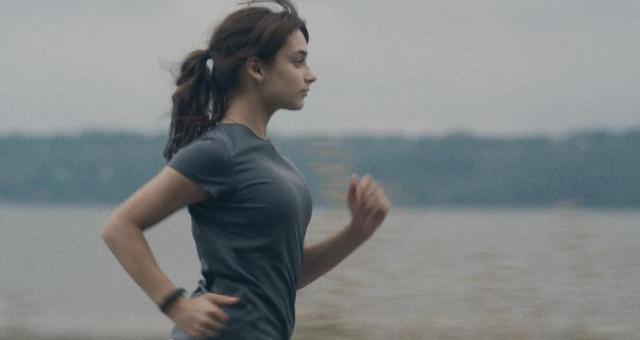 The title of Chloé Robichaud’s debut is accurate, but also too accurate in advertising its limitations. 20-year-old Sarah (Sophie Desmarais) does indeed enjoy running, whether around her neighbourhood, on the track, or on a running machine with her teammates. From what she is running, it’s not entirely clear.
The title of Chloé Robichaud’s debut is accurate, but also too accurate in advertising its limitations. 20-year-old Sarah (Sophie Desmarais) does indeed enjoy running, whether around her neighbourhood, on the track, or on a running machine with her teammates. From what she is running, it’s not entirely clear.
Running is turning into an overused motif, with one very pertinent example being Robin Wright in House of Cards; her jogging figure turns into an hammered-in metaphor by the fifth episode. Sarah Prefers to Run doesn’t go much further – Sarah’s competitive races noticeably takes place on a circular track.
The bittersweet coming-of-age story does have its merits, particularly a delicate performance by Desmarais as a timid woman who somehow finds herself rushed into a marriage (with the first response being, “Do you mind if I take off my ring?”) Robichaud is also pensive with shots solemnly framed, often with an evocative score for added momentum.
One defining scene involves Sarah’s new husband (Jean-Sébastien Courchesne) sobbing, rhetorically asking why he’s in love with a tomboy who doesn’t smile and isn’t funny. That simultaneously picks at the film’s root problem: many scenes hang on an inexpressive runner, whose defining feature is a literally defective heart. When the Kubrick-style closing credits appear, the gulf in ambition is evident.
Sixteen – 3/10
Director/Writer: Rob Brown
Starring: Roger Jean Nsengiyumva, Rachael Stirling, Rosie Day
Any release date: TBC
Strand: First feature
“You’re on first name terms with murderers now?”
 Teenagers are unpredictable and inversely affected by the early years of their life, so it’s unsurprising that Jumah is still haunted by his past as a child soldier in Congo. The role, taken up by Roger Jean Swngiyumva, is the central hook of Sixteen, a downbeat drama about the hardship of running away from demons when aspects reappear in London.
Teenagers are unpredictable and inversely affected by the early years of their life, so it’s unsurprising that Jumah is still haunted by his past as a child soldier in Congo. The role, taken up by Roger Jean Swngiyumva, is the central hook of Sixteen, a downbeat drama about the hardship of running away from demons when aspects reappear in London.
Rob Brown’s first feature film has Jumah living with his adopted mother, a nurse played by Rachael Stirling. The city’s grimy setting is coupled by Jumah’s run-ins with local criminals, both one-dimensional in behaviour and as a narrative device.
Sixteen delves into ultra self-serious territory with plodding silences and Jumah staring wistfully into the distance. However, the unnatural tone is more of a consequent from some unconvincing acting; pauses are the wrong length, while the cast stumble with thinly written characters.
A quick search for Rob Brown’s biography reveals his history comprises of short films, which is perhaps where Sixteen belongs: as a small snapshot of the difficulties of adapting to a new environment. As it is, the Rubik’s Cube on Jumah’s bedside table is the only thought-provoking element, rather than any of the social commentary.
Weekend of a Champion – 7/10
Director: Frank Simon
Starring: Roman Polanski, Jackie Stewart
Strand: Thrill
UK release date: TBC
US release date: 22nd November 2013
“All the pain disappears.”
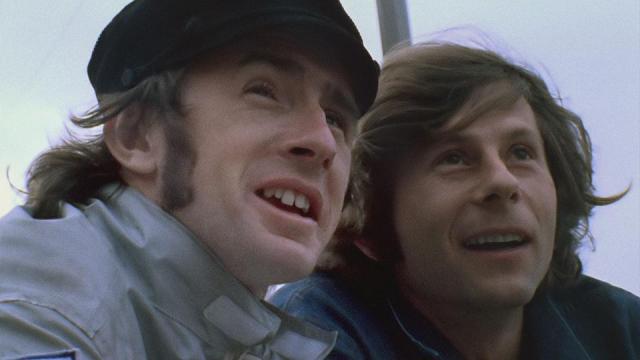 The original Weekend of a Champion came out in 1972, barely to be seen again, let alone receive a victory lap. The modest documentary tackled two not-so-modest figures: Formula 1 driver Jackie Stewart and film-maker Roman Polanski. Four decades later, the film is digitally restored, with a 20-minute coda of Stewart and Polanski reflecting on how their lives have since changed.
The original Weekend of a Champion came out in 1972, barely to be seen again, let alone receive a victory lap. The modest documentary tackled two not-so-modest figures: Formula 1 driver Jackie Stewart and film-maker Roman Polanski. Four decades later, the film is digitally restored, with a 20-minute coda of Stewart and Polanski reflecting on how their lives have since changed.
The 1972 material is a simple video diary of Stewart preparing for a race in Monaco, with Polanski somewhere between an investigative journalist and nosey friend. The pair’s dynamic is fascinating, not just for Stewart’s charismatic deconstruction of his racing techniques, but for a rare glimpse of Polanski’s lighter, human side – one that’s not reflected in his films, nor his criminal record.
One particularly charming moment involves Stewart using his finger to race a packet of butter across a table to illustrate when to break. The low-key moment only works because it occurs just off the race track in an era fraught with numerous racing fatalities. In retrospect, the lack of protective measures is shocking; crowds stand by the road without any barriers in place.
Weekend of a Champion is a strange curiosity, given it encompasses decades-old footage that wasn’t as sought after as, say, The Day the Clown Cried. It’s also unlikely to fully satisfy anyone without an interest in Formula 1 or Polanski. Even those curious by the latter should note none of the director’s eventful life is questioned, and nor does Stewart visit the set of Repulsion to attempt shooting a nightmare sequence.
Perhaps tellingly, much of the documentary is worthless without the 2011 footage. With four decades of hindsight, Stewart adds insight into the sport’s old philosophy, while also shining light on how he hid his own insecurities during filming – even the champion of the documentary’s title felt beaten down by the world.
Personally, the most surprising aspect is that Stewart and Polanski are still friends. They’re both carried by strong egos in respective fields, yet seem to be opposites. When Stewart cuts himself shaving, he jokingly suggests it should feature in a Polanski film. However, the real allusion comes from an admittance that Formula 1 is claustrophobic – spinning round the same track, trapped under multiple seatbelts. So based on the running theme of Polanski’s career, it seems the sport’s dangerous aspects are actually a lifetime obsession for both figures.
As Stewart puts it: against all logic, sitting behind the wheels makes all the pain disappear.
Wounded – 5/10
Original title: La herida
Director: Fernando Franco
Writers: Fernando Franco, Enric Rufas, Ramón Barea
UK/US release date: TBC
Strand: First feature
Starring: Marian Álvarez, Rosana Pastor, Andrés Gertrudix
“It must be exciting being in an ambulance?”
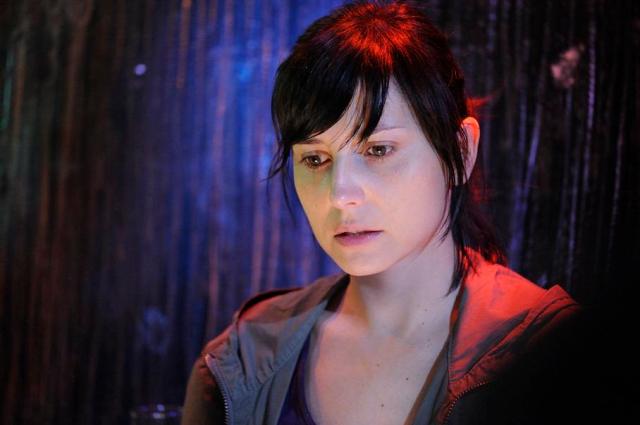 30-year-old Ana is a self-harmer, a secret she hides from her mother and work colleagues. She speaks at length on the internet in several tedious sequences. There’s something interesting underneath, with Franco mentioning in his Q&A the character is based on several search studies. However, that creates a lack of coherence. What might be compelling is to others is repetitive to me. A memorable moment is Ana’s life as an ambulance driver. She switches to transfers to avoid seeing people die, but finds it’s worse getting to know them first.
30-year-old Ana is a self-harmer, a secret she hides from her mother and work colleagues. She speaks at length on the internet in several tedious sequences. There’s something interesting underneath, with Franco mentioning in his Q&A the character is based on several search studies. However, that creates a lack of coherence. What might be compelling is to others is repetitive to me. A memorable moment is Ana’s life as an ambulance driver. She switches to transfers to avoid seeing people die, but finds it’s worse getting to know them first.
Follow @halfacanyon for more.

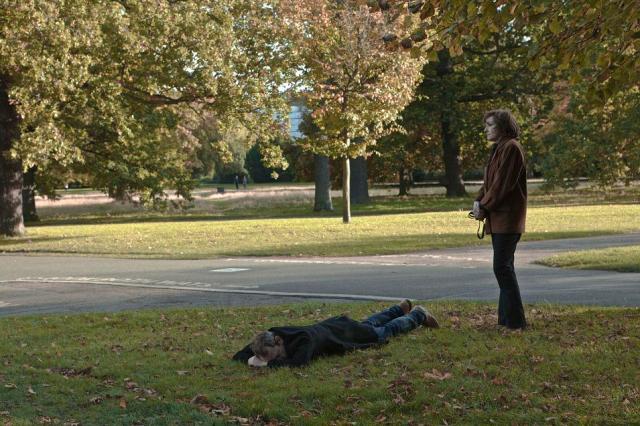
Pingback: Kenicky’s 2013 film roundup | HALF A CANYON: The Greek chorus of UK film blogs
Pingback: LFF13 Cult reviews: “The Zero Theorem”, “The Congress”, “All Cheerleaders Die”, “The Sacrament” and 3 others… | HALF A CANYON: The Greek chorus of UK film blogs
Pingback: LFF13 Laugh reviews: “Enough Said”, “Doll & Em”, “Computer Chess”, “Drinking Buddies” and 5 others… | HALF A CANYON: The Greek chorus of UK film blogs
Pingback: Kenicky’s 2014 film roundup | HALF A CANYON FILM BLOG: A traffic jam when you're already a plate